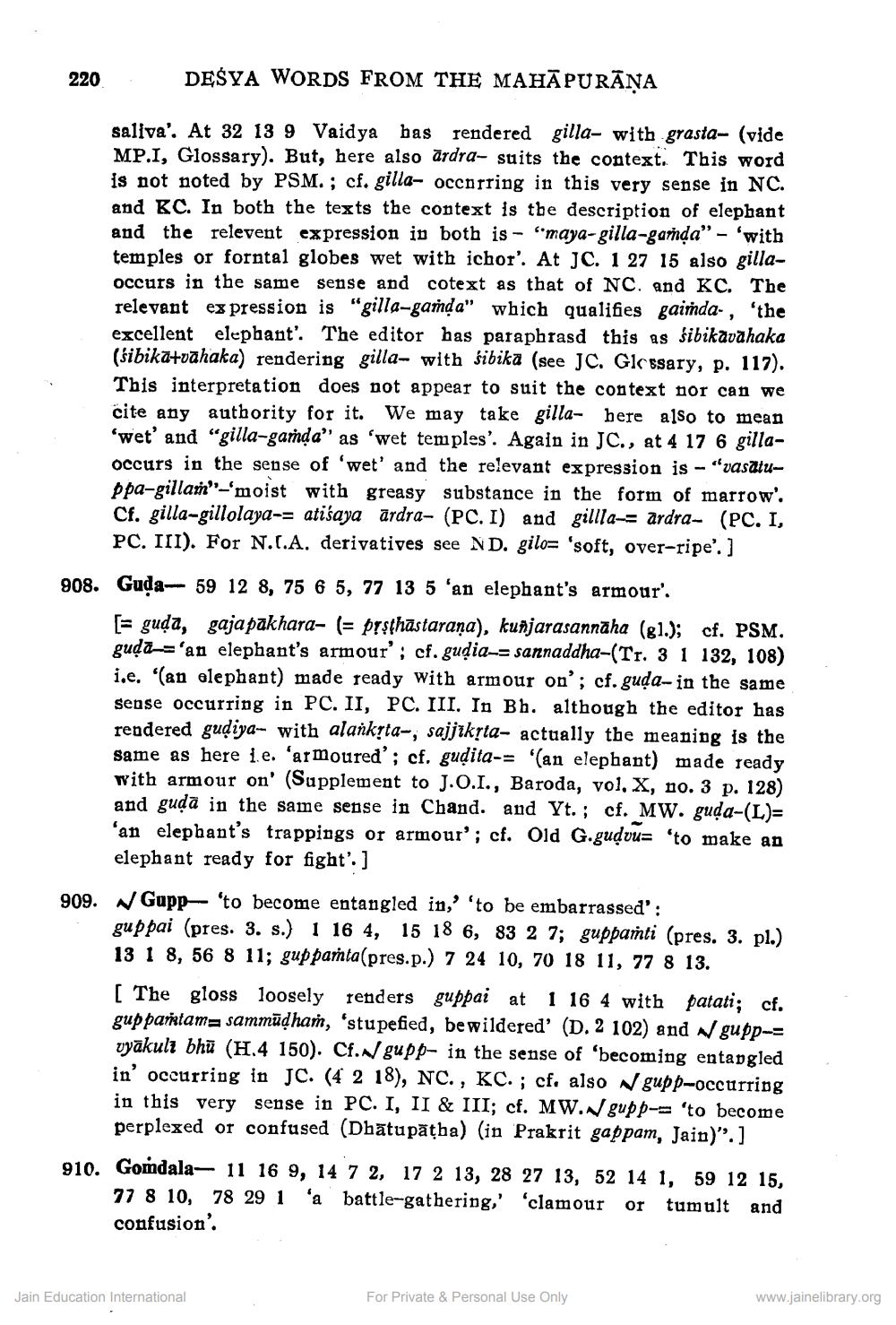________________
220.
DEŚYA WORDS FROM THE MAHĀPURĀNA
saliva'. At 32 13 9 Vaidya bas rendered gilla- with grasta- (vide MP.I, Glossary). But, here also ardra- suits the context. This word is not noted by PSM.; cf. gilla- occnrring in this very sense in NC. and KC. In both the texts the context is the description of elephant and the relevent expression in both is - "maya-gilla-ganda" - 'with temples or forntal globes wet with ichor'. At JC. 1 27 15 also gillaoccurs in the same sense and cotext as that of NC. and KC. The relevant expression is "gilla-ganda" which qualifies gaiṁda, 'the excellent elephant. The editor has paraphrasd this as sibikavahaka (sibikatvahaka) rendering gilla- with śibika (see JC. Glossary, p. 117). This interpretation does not appear to suit the context for can we cite any authority for it. We may take gilla- bere also to mean 'wet' and "gilla-garda” as 'wet temples'. Again in JC., at 4 17 6 gillaoccurs in the sense of 'wet' and the relevant expression is - "vasatuppa-gillam"-moist with greasy substance in the form of marrow'. Cf. gilla-gillolaya-= atiśaya ārdra- (PC. I) and gillla-= ardra- (PC. I, PC. III). For N.C.A. derivatives see ND. gilo= 'soft, over-ripe'. ]
908. Guļa- 59 12 8, 75 6 5, 77 13 5 'an elephant's armour'.
= guda, gaja pakhara- (= prsthāstarana), kunjarasannäha (81.); cf. PSM. guda--'an elephant's armour'; cf. gudia-= sannaddha-(Tr. 3 1 132, 108) i.e. '(an elephant) made ready with armour on'; cf. guda- in the same sense occurring in PC. II, PC. III. In Bh. although the editor has rendered gudiya- with alaňkyta-, sajjiksla- actually the meaning is the Same as here i.e. 'armoured'; cf. gudita-= '(an elephant) made ready with armour on' (Supplement to J.O.I., Baroda, vol, X, no. 3 p. 128) and guda in the same sense in Chand. and Yt. ; cf. MW. guda-(L)= ‘an elephant's trappings or armour'; cf. Old G.gudvu= 'to make an elephant ready for fight'. ]
909. » Gupp— 'to become entangled in,' 'to be embarrassed':
gu p pai (pres. 3. s.) 1 164, 15 18 6, 83 2 7; guppamti (pres. 3. pl.) 13 1 8, 56 8 11; gupparnta(pres.p.) 7 24 10, 70 18 11, 77 8 13.
[ The gloss loosely renders guppai at 1 16 4 with patati; cf. guppartam= sammüdhan, 'stupefied, bewildered' (D. 2 102) and 1 gupp-- vyakuli bhū (H.4 150). Cf. gupp- in the sense of 'becoming entangled in' occurring in JC. (4 2 18), NC., KC. ; cf. also » gupp-occurring in this very sense in PC. I, II & III; cf. MW. gupp-- 'to become perplexed or confused (Dhātupātha) (in Prakrit gappam, Jain)”.]
910. Gomdala— 11 16 9, 14 7 2, 17 2 13, 28 27 13, 52 14 1, 59 12 15,
77 8 10, 78 29 1 'a battle-gathering, 'clamour or tumult and confusion'.
Jain Education International
For Private & Personal Use Only
www.jainelibrary.org




